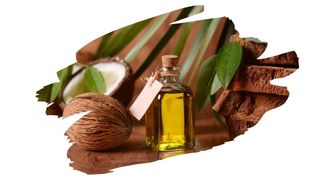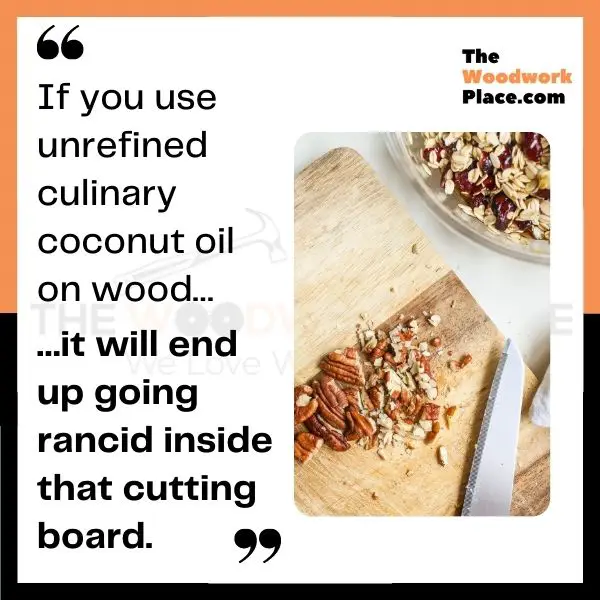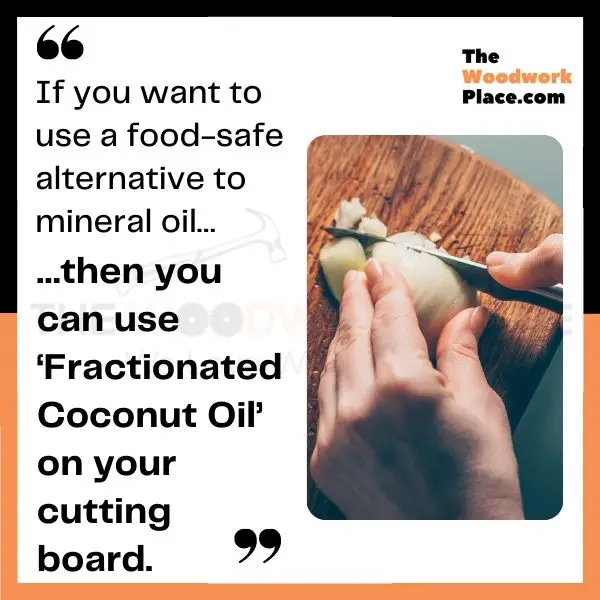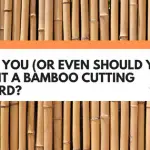We all want our well-made cutting boards to last a good long time. And, when it comes to wooden chopping blocks, you also need to keep it moisturized too.
And moisturizing wooden cutting boards allow you to do just that, by dousing that timber surface with a non-drying conditioning oil.
But, when it comes to cutting boards, not all oils are made equal…
Most non-drying oils – especially in their natural unrefined states – make for terrible oil finishes on any wooden surface.
Related Post: Walnut Oil Vs Mineral Oil: Which One’s Better For Your Cutting Board?
For example, coconut oil is a wildly popular product used for everything from cooking, to health care, cosmetics, and even weight loss. And at last count the coconut oil industry rakes in over $3 billion in sales worldwide.
So, you’d be forgiven to think that maybe this natural wonder-oil can also keep wood in tip top condition.
Yet, can you really use fractionated coconut oil on your cutting board?
Well, in this post, you will find out what you need to look for in a conditioning oil. You will also learn why fatty acids can make coconut oil a ‘rotten’ choice for wood.
And you will discover what makes fractionated coconut oil so much better for wood, than its unrefined counterpart.

This post may contain affiliate links to products that we receive a commission for (at no additional cost to you). Learn more here.
How Do You Seal A Wooden Cutting Board?
You can seal a cutting board by saturating it with a non-drying oil. The oil works by soaking into grain, coating wood fibers with a water repellent grease.
But, it is important that you only use a non-drying oil that won’t expire.
You see, many unrefined non-drying oils (like vegetable oil, sunflower oil, and even coconut oil) should not be used to seal or maintain wood. This is because those oils have a limited shelf life.
And if you put them on wood, they will go rancid. Worse still, they can cause bacteria to build up inside cutting board grain.
And, What Is A Non-Drying Oil?
When it comes to wood finishing, oil finishes fall into one of two groups; drying and non-drying oil finishes.
To put it simply, non-drying oils are oils that do not dry. They forever stay greasy to the touch, unless they are washed off. They also do not harden into a film coat.
Conversely, drying oils are oils that will dry. Not only that, these oils further undergo a chemical process called ‘curing’. And once a drying oil has cured, it turns from a liquid into a hard durable resin.
Now, full disclosure, you can use a drying oil to seal a cutting board. Once a drying oil has cured, it is food safe.
However, drying oils can take weeks to wholly cure. And, since they aren’t waterproof, washing that cutting board will also wash off a cured oil coat over time too.
So, it is much easier (and quicker) to simply stick to using non-drying oils on your chopping block.
Related Post: Is Tung Oil Food Safe Enough To Eat Off?
What Kind Of Oil, Exactly, Should You Use To Seal A Cutting Board?
Well, first off, you need to use a non-drying oil that will never go rancid. So, you can cross most unrefined food-sourced oils off the list of possibilities.
Instead, you should ideally use food grade pure mineral oil on your cutting board.
Now, mineral oil is sourced from petroleum. But, most types of mineral oil (such as paraffin oil), are toxic.
So, you should only ever use pure food grade mineral oil. This version of mineral oil comes from a highly refined and filtered petroleum, called petroleum distillate.
Long story short, food grade mineral oil is not toxic, and can even be consumed. But, cautionary note, food grade mineral oil is used as a pharmaceutical remedy, not as a cooking oil or dressing.
Related Post: Walrus Oil Vs Odie’s Oil: Which One’s Better For Your Cutting Board?
Can You Use Coconut Oil Instead Of Mineral Oil? Or Should It Be Avoided?
If that coconut oil is the unrefined culinary version, then you should not use this oil on a cutting board.
That is because unrefined coconut oil will go off in a matter of months. So, soaking your cutting board in this coconut cooking oil, is just an all around bad idea.
However, heavily filtered coconut oil – otherwise known as fractionated coconut oil – can be used as a wood preservative.

Will Coconut Oil Always Go Rancid On Wood?
Well, regular consumable coconut oil will definitely go rancid over time. It has a long expiry date, for sure, but it will still expire all the same.
That is why grocery store cooking oil is a firm no-no as a wood preserving oil.
Is Unrefined Coconut Oil Good For Cutting Boards? Unrefined coconut oil will go rancid, so don’t use it to season your cutting board.
However, if this natural oil has been fractionated, then this specially filtered version of coconut oil won’t go off. And this is where things get interesting…
What Does Fractionated Mean When It Comes To Coconut Oil?
Fractionated coconut oil has been put through a special treatment that separates the fatty acids found in coconut oil.
This fractionated version of coconut oil is basically a filtered (and more watery) version of naturally thick unrefined coconut oil.
In fact, fractionated coconut oil is so refined, its virtually odorless, and has next to none of that coconut flavor left in it.
Can You Use Fractionated Coconut Oil On Wood? Will It Protect Wood?
Yes, you can drench a cutting board with fractionated coconut oil. And it’ll work just as well as any non-drying food safe oil.
Which means that it will act as a wood preservative by preventing water, bacteria, and fluids from soaking into wood fibers.
Also, it will moisturize dry wooden surfaces, preventing timber from cracking and splitting apart.
And one of the best fractionated coconut oil products on the market comes from Verdana. Their USDA certified fractionated coconut oil product is 100% pure.
Both food-grade safe and odorless, they sell it by the budget-friendly gallon.
You can check out the latest prices for this fractionated coconut oil product over on Amazon.com
Can You Use Fractionated Coconut Oil On a Cutting Board? Fractionated coconut oil is a non-drying, food safe oil that won’t go rancid. So, it can be safely used to preserve and moisturize your wooden cutting board.
Will Fractionated Coconut Oil Go Rancid?
Nope, it does not. And here’s why…
Fractionated coconut oil has had all of its fatty acids removed. To be a little more specific, the key fatty acid in coconut oil, called 12-carbon lauric acid (C12), has been purged from it.
Now, these fatty acids have a limited shelf life – hence why they’re the main reason for coconut oil going off. And if you remove these fats, you are left with a non-drying oil that won’t go bad.

And Does Fractionated Coconut Oil Darken Wood?
This clear colorless oil won’t darken wood. Or at least it won’t darken it beyond the natural color change caused by any clear liquid on timber.
But, unlike say a Linseed oil wood finish, fractionated coconut oil won’t darken wood further over time. And it won’t deepen the hue of light pale wood types, such as Maple, either.
Related Post: Cherry Vs Maple Cutting Boards (3 Essential Comparisons)
To Wrap Up, Here Are The 3 Main Takeaways…
- 1). Pure food-grade mineral oil is – by far – the single best non-drying oil for a cutting board.
- 2). If you use unrefined culinary coconut oil on wood, it will end up going rancid inside that cutting board.
- 3). If you want to use a food-safe alternative to mineral oil, (that won’t go bad), then you can use ‘fractionated coconut oil’ on your cutting board.
References:
https://www.statista.com/statistics/288367/coconut-oil-consumption-united-states/



